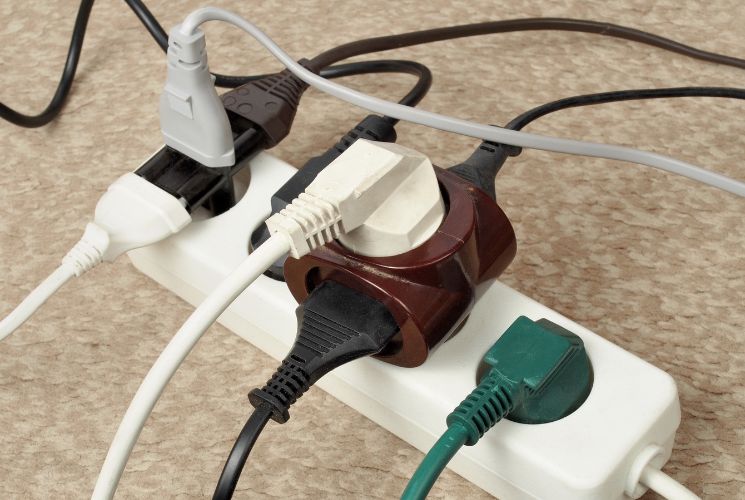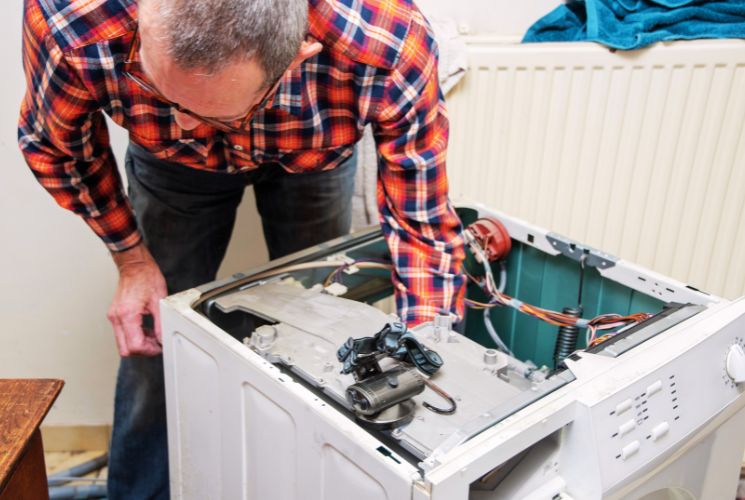Why Your Appliances Keep Tripping the Breaker – Issues Explained
If parts of your home go dark, a tripped breaker is likely the cause. If it happens every time you use certain appliances, it means there’s an issue with your electrical system. Let’s take a closer look at what your appliances are doing to cause a breaker to trip, and what you can do to stop it.
What Does It Mean When a Breaker Trips?
First, knowing what a breaker does is helpful. Consider your circuit breaker to be the electrical systems safety net. It monitors the electricity flow and automatically cuts off power if it finds that a circuit is carrying too much current.
Why does it act in this way? Because excessive electricity poses a serious fire risk by overheating your wires. A breaker is not punishing you when it trips. It is safeguarding both you and your house. It can be compared to the integrated smoke alarm in your electrical system.
Common Reasons Appliances Trip the Breaker
Several things can cause a breaker to trip, but when it happens repeatedly with certain appliances, there are a few usual suspects:
1. Overloaded Circuit
One of the most common reasons is a simple overload. Every circuit in your home is designed to handle a certain amount of electricity. If you’re running multiple high-power appliances on the same circuit, such as your microwave, toaster, and fridge all on the same line, you can easily exceed the circuit’s limit.
When that happens, the breaker trips to prevent overheating. It’s your home’s way of saying, “Whoa, too much for me to handle.”
Pro tip: Spread out your high-energy appliances across different outlets and circuits whenever possible. It’s a simple fix that can save a lot of headaches.

2. Short Circuits
Short circuits are a bit more serious. This happens when a hot wire touches a neutral or ground wire, causing a sudden surge of electricity. Not only does this trip your breaker immediately, it can also be dangerous.
Short circuits can be caused by damaged wiring, frayed cords, or even faulty appliances. If you notice sparks, burning smells, or frequent tripping, it’s time to call a professional.
Pro tip: Never ignore a breaker that trips repeatedly. Short circuits can lead to fires if not addressed promptly.
3. Ground Faults
Ground faults are similar to short circuits, but they involve electricity leaking outside the intended circuit, usually into the ground. Ground-fault circuit interrupters, or GFCIs, are designed to trip when this happens, protecting you from electric shocks.
Bathrooms, kitchens, and outdoor outlets are common places for ground faults because of the presence of water. Appliances like dishwashers, washers, or even outdoor power tools can trigger these breakers if there’s a ground fault.
Pro tip: Make sure your appliances are plugged into properly grounded outlets and avoid using damaged cords near water.
4. Aging Appliances or Wiring
Sometimes, it’s not the circuit, it’s the appliance. Older appliances can draw more power than they used to, especially if internal components are wearing out. Similarly, homes with older wiring may have circuits that cannot handle modern energy demands.
Signs your appliances might be part of the problem:
- The breaker trips only when a specific appliance is on.
- The appliance seems to struggle to start or runs intermittently.
- You notice unusual buzzing or flickering lights.
In these cases, it may be time to repair or replace the appliance or even upgrade your electrical system.

How to Identify the Culprit
Finding the cause of repeated breaker trips can feel like detective work, but here are some steps to help you zero in on the problem:
- Notice the pattern. Does the breaker trip with a specific appliance or does it happen randomly?
- Check the circuit load. How many devices are running on the same circuit? High-energy appliances like ovens, dryers, and space heaters can easily overload a standard circuit.
- Inspect cords and plugs. Frayed wires, bent prongs, or scorch marks are red flags.
- Test with a different outlet. If an appliance trips the breaker on one circuit but runs fine on another, the issue may be the original circuit rather than the appliance.
- Call in a professional. If the cause isn’t obvious or if you suspect a short circuit or ground fault, don’t risk it. Electricians and appliance repair experts have the tools to safely diagnose and fix the problem.
Preventing Breaker Trips
The good news is, many breaker trips are preventable. Here are some practical tips:
- Don’t overload circuits. Spread out appliances and avoid running too many heavy-duty devices simultaneously.
- Upgrade your electrical system. If you live in an older home, it may be time for a circuit upgrade or even dedicated circuits for high-wattage appliances.
- Maintain your appliances. Keep cords and plugs in good condition, clean appliances regularly, and replace worn-out parts.
- Use the right outlets. Make sure heavy-duty appliances are plugged into outlets rated for their power needs.
- Install GFCI and AFCI outlets. These devices add an extra layer of safety, particularly in areas prone to moisture or arc faults.
Stay Safe and Keep Your Appliances Running
Breaker tripping is not merely an inconvenience; it is an indication from your home that something has gone awry. Once you understand what causes a breaker to trip, keep circuits balanced, and to factor in the wear and tear of our appliances, your risk of experiencing an unexpected outage is highly reduced.
Never forget that a breaker tripping repeatedly, at any time, is not normal. It is your home telling you that it needs to be attended to. Whether the cause is circuit overload, a short, or breakdown due to wear from the appliance, taking action can enhance your well-being and save you money, aggravation, and the potential for danger.
At ASAP Appliance Repair, we fuse appliance expertise with a safety-first approach for residential homes, ensuring that everything around your home remains safely and readily powered. So next time the breaker tripped, you will know what was happening and how to resolve.


